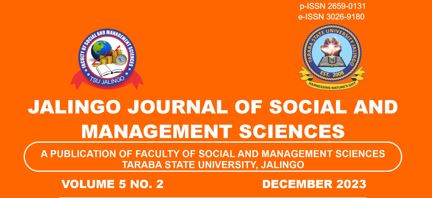Political Leadership and Infrastructural Development in Taraba State, 2015-2019
Keywords:
Governance, infrastructural development, internally generated revenue, political leadership, Taraba StateAbstract
Recent studies have revealed that Taraba State is more of consumer economy than productive economy due to poor internally generated revenue capacity and meagre statutory allocation from the federal government. While neighbouring states, particularly Gombe State with a similar situation have achieved a remarkable level of infrastructural development, the case of Taraba State appears to be different. This study was specifically carried out to determine the relationship between political leadership and the development of infrastructure in Taraba State. The study relied on documented evidence, interviews and questionnaire for data generation and statistical analysis. The theoretical framework for the study is public choice theory. Findings of the study were that the poor state of infrastructural development in Taraba State is a political leadership challenge. This challenge stems from factors such as misappropriations of funds, high-level recurrent expenditure, poor expenses, corruption, wastage of resources, and the lack of continuity in governance. The study recommended the minimization of overhead spending on elected and appointed political officeholders and right-sizing of the number of senior assistants and special advisers to governors. It also suggests that government should deal with corrupt leaders as enshrined in the constitution of the Federal Republic of Nigeria, and attention should also be given to internally generated revenue by leveraging on the state's abundant untapped resources to bring about infrastructural development in the state.

Downloads
Published
Issue
Section
License
Copyright (c) 2023 JALINGO JOURNAL OF SOCIAL AND MANAGEMENT SCIENCES

This work is licensed under a Creative Commons Attribution-NonCommercial 4.0 International License.
